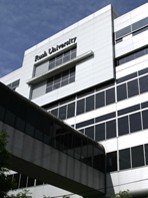Rare Book Library Sells 3,700 Book Collection
- by Michael Stillman

Rush University, from their website.
By Michael Stillman
It was one of the largest, single owner book sales in recent memory, but it passed by virtually unnoticed. This was not an ordinary sale, as it also involved the extremely touchy issue of library de-accession. We have written about this controversial topic in the past (click here), but this story has a happier ending then those at, say, the University of San Francisco. This collection moved in bulk, all 3,700 volumes, from one library to another. No one, as best we can tell, came out of this transaction unhappy.
The collection in question was the Stanton A. Friedberg, M.D. Rare Book Room collection at Rush University in Chicago. Rush is a medical school, Friedberg a graduate thereof. He had donated his collection of 3,700 books dating back as far as 1500 to Rush. However, the collection has been virtually unused for many years. Rush is more involved in current medical research and issues and does not have a focus on the history of medicine. Fortunately, its neighbor and once affiliated college, the University of Chicago, does. The result was about as perfect a storm as you can get. The University of Chicago is close by, the two universities were affiliated when Friedberg graduated, and Friedberg was also a supporter of the University of Chicago. For a university wishing to de-accession a collection that no longer served it any purpose but to rack up bills, this was a match made in heaven. What's more, the University of Chicago wanted the collection.
As perfect as the arrangement was, the two universities went one more step to make sure the transaction would be as respectful as possible to Mr. Friedberg and his earlier donation. Proceeds of the sale will be used to create an endowment in Friedberg's name "to support scholarly activities" at the Rush Library. Meanwhile, the University of Chicago will name the collection the "Stanton A. Friedberg M.D. Rare Book Collection of Rush University Medical Center at the University of Chicago." Friedberg's name will now be remembered in two places, and anyone from Rush University who should want to see the books will have access at the University of Chicago. One can only think that Mr. Friedberg would be pleased with this solution to the issue his collection was causing Rush University in today's environment.
Terms of the sale were not disclosed.
The issue of libraries needing to de-accession unused, but valuable and gifted books will probably come up with increasing frequency in the years ahead. It is unlikely most will have such a perfect solution, a close-by neighbor who wishes to take on the collection in whole. Still, de-accessioning institutions will need to find ways to complete these transactions in ways that do as little as possible to upset members of their community or the memory (and heirs) of those who made the contributions. Rush University found a perfect solution. Others will probably have to be more creative, but Rush has set a fine example.